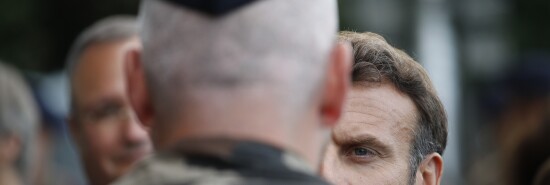
Germany is under simulated attack. Where is France’s ‘Strategic Autonomy’ force?
Tom Rogan
Video Embed
Germany is under simulated attack in NATO‘s ongoing Air Defender 23 exercise.
The United States has deployed 100 aircraft, including F-15, F-16, F-18, F-35 fighter aircraft, EA-18 electronic warfare aircraft, KC-46 and KC-135 refuelers, and C-17 and C-130 transports to defend its ally.
GAVIN NEWSOM’S CAMPAIGN TO REPEAL THE SECOND AMENDMENT
This reflects a U.S. recognition that NATO serves Americans and our interests. But no alliance can prosper if burdens are not fairly shared. That point bears noting about what Germany‘s neighbor and the European Union’s second-largest economy is contributing to Air Defender 23. Because according to a German air force spokesperson, “France is taking part with one E-3F Warning and Control Aircraft.”
One aircraft.
So much for President Emmanuel Macron‘s “strategic autonomy” doctrine for European foreign and defense policy independence from the U.S. Indeed, France’s solitary commitment to Air Defender 23 is proof positive as to why Eastern European states are rather skeptical of Macron’s initiative.
Measured by the critical test of allied resolve, and readiness to fight tonight, they have 101 reasons to believe Macron’s “strategic autonomy” doctrine is built on hot air. After all, there could hardly be a more pertinent test of that doctrine than this exercise. As NATO described it:
“The OCCASUS alliance is trying to push north to the Baltic Sea and take possession of the port of Rostock. To do so, it is using a mix of sabotage operations and the use of special forces supported from the air. As a result, the Western alliance triggers a state of defense under Article 5 of the NATO treaty. … The core of the large-scale exercise is to test the military’s ability to react and act in the air in a resilient manner and to be able to protect the population from medium-range missiles, for example.”
OCCASUS (read Russia/Belarus) is attacking Germany so as to project power through the Baltic Sea and presumably against French borders. Macron doesn’t appear to care. The deployment of just one aircraft from France’s otherwise capable air force, which includes highly capable Rafale fighter jets and excellent pilots, is telling.
This speaks to a broader concern.
Much of the Air Defender 23 media attention is focused on NATO’s deterrent message to Russia. In reality, however, the main lesson here is proof of how heavily European NATO members continue to rely on the U.S. for their defense. This should be a major concern for the Biden administration and Congress.
China’s escalating threats to a U.S. treaty ally, the Philippines, and to Taiwan make a U.S.-China conflict increasingly likely. The People’s Liberation Army is no OCCASUS fiction.
For an example of what Europe’s dependence on the U.S. looks like, consider the radar map below. It’s a Washington Examiner screenshot from the ADS-B flight tracking website. Taken at 11:20 a.m. Eastern time on Thursday, the screenshot indicates the military aircraft that were operating around Germany at the time. It shows that the U.S. had five air refuelers up (circled in red). The British and Dutch Air Forces each had one air refueler aloft. No other NATO air force had a refueler airborne. The Europeans lack enough of those aircraft because they have long taken comfort in the U.S. footing the bill for that capability.

There are obvious differences between the U.S. and its European allies on China, especially when it comes to Macron.
CLICK HERE TO READ MORE FROM THE WASHINGTON EXAMINER
These disagreements are legitimate even if they undermine the central plank of what has kept the U.S. and Europe prosperous, free, and largely at peace: an international order built on the democratic rule of law. Still, while France is increasing defense spending, even Macron must surely have to admit that strategic autonomy isn’t going to prosper unless France is able and willing to project defensive power in Europe.
What we’re seeing at Air Defender 23 is the very opposite of that.
